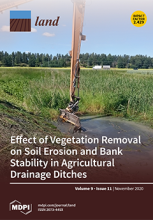/ library resources
Showing items 1 through 9 of 13.Achieving change to address soil erosion has been a global yet elusive goal for decades. Efforts to implement effective solutions have often fallen short due to a lack of sustained, context-appropriate and multi-disciplinary engagement with the problem.
We set out to unveil gender inequality with respect to women’s access to family land following the surge in tree-planting in selected villages in the Southern Highlands of Tanzania.
Conservation agriculture continues to be promoted in developing nations as a sustainable and suitable agricultural practice to enhance smallholder productivity. A look at the literature indicates that this practice is successful in non-African countries.
The United Arab Emirates (UAE) has witnessed fast growth in urban development in the past four decades. A plan to build 7270 houses by 2021 has been initiated by the local authorities.
The topic of large-scale land acquisition (LSLA) has attracted wide interest in the literature and the media. However, there is little work on the gendered institutional changes and gendered impacts on common pool resources (CPR) due to LSLA. The aim of this paper is to address these impacts.
The preservation of soils which provide many important services to society is a pressing global issue. This is particularly the case in countries like Tanzania, which will experience rapid population growth over coming decades.
United Nations Educational Scientific and Cultural Organization (UNESCO) Biosphere Reserves strive for a harmonious interaction between humans and nature.
An increasing number of African States are recognizing customary land tenure. Yet, there is a lack of research on how community rights are recognized in legal and policy frameworks, how they are implemented in practice, and how to include marginalized groups.
We studied livelihood changes and poverty dynamics over a 25-year period in two villages in central Tanzania. The villages were, from the early 1990s and 2000s, strikingly poor with between 50% and 55% of families in the poorest wealth groups.
Paginação
Land Library Search
Through our robust search engine, you can search for any item of the over 73,000 highly curated resources in the Land Library.
If you would like to find an overview of what is possible, feel free to peruse the Search Guide.






